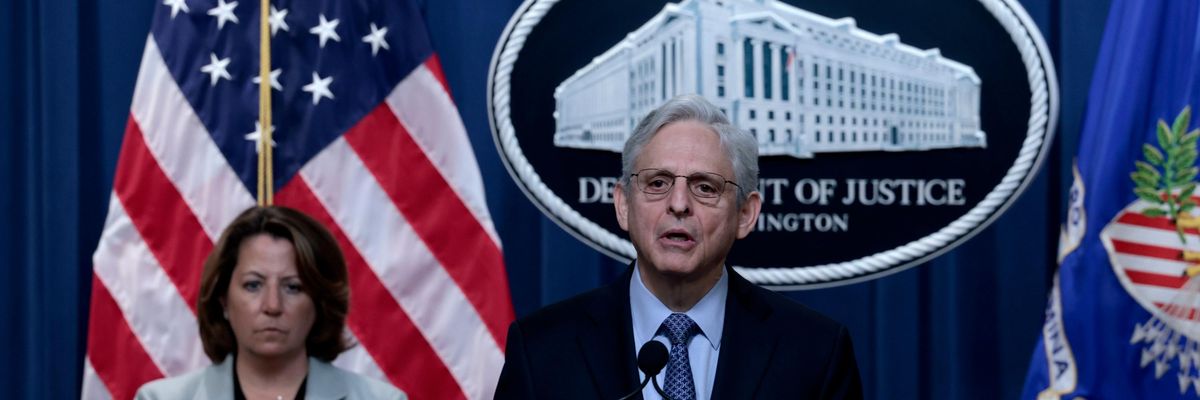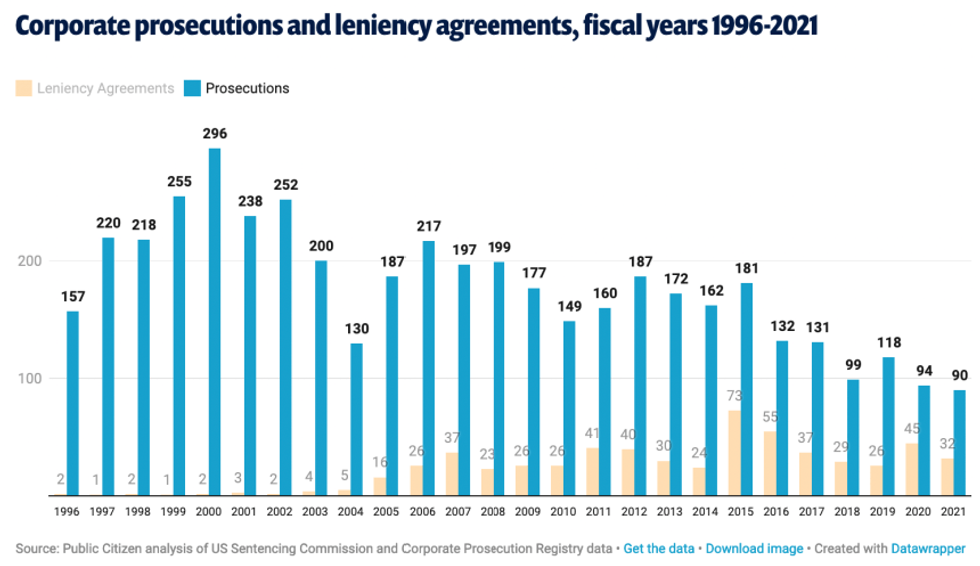

SUBSCRIBE TO OUR FREE NEWSLETTER
Daily news & progressive opinion—funded by the people, not the corporations—delivered straight to your inbox.
5
#000000
#FFFFFF
To donate by check, phone, or other method, see our More Ways to Give page.


Daily news & progressive opinion—funded by the people, not the corporations—delivered straight to your inbox.

U.S. Attorney General Merrick Garland speaks at a press conference on April 6, 2022 in Washington, D.C. (Photo: Anna Moneymaker/Getty Images)
Despite the Biden administration's pledges to be tougher on corporate crime than its business-friendly predecessor, a new report published Monday shows that corporate prosecutions reached a record low in 2021, continuing a decline that accelerated under former President Donald Trump.
"The Trump administration's soft-on-corporate-crime enforcement policies are having a holdover effect."
Citing data from the U.S. Sentencing Commission and the Corporate Prosecution Registry, the consumer advocacy group Public Citizen notes in its analysis that just 90 corporations either pleaded guilty or were found guilty of federal crimes last year even as the Justice Department--led by Attorney General Merrick Garland--announced policies aimed at strengthening enforcement efforts against white-collar offenses.
The previous record low was 94 corporate prosecutions in 2020, down from a peak of 296 in 2000.
"The Biden DOJ's policy changes away from Trump's soft-on-corporate-crime approach suggest enforcement against corporate lawbreakers should be ramping up, but the numbers for 2021 don't reflect those changes," Rick Claypool, a research director for Public Citizen and author of the new report, said in a statement.
"Deterring corporate monopolists, polluters, fraudsters, and workplace abusers requires the DOJ to bring tough prosecutions," Claypool added. "It's the only way to show big business that the cost of crime outweighs any perceived benefit of profit-driven lawbreaking... Garland must prioritize prosecuting these cases, and President Biden and Congress need to provide the DOJ with the resources to do the job."
Related Content

Public Citizen also found that the Justice Department's use of so-called corporate-leniency agreements as an alternative to bringing criminal charges against law-breaking companies remains "extraordinarily high" under Biden.
Such agreements, according to Public Citizen, made up 26% of all concluded federal cases against corporations in 2021--a decline from 32% in 2020 but a massive increase over 1996, when federal prosecutors entered leniency agreements with companies just 1% of the time.
"The rationale for the DOJ's use of these agreements with corporations is that they facilitate corporate compliance with the law," the report notes. "The empirical evidence, however, shows that corporations that receive leniency agreements instead of facing prosecution are not deterred from reoffending."

Public Citizen points out that the Biden Justice Department has taken a number of promising steps aimed at cracking down on corporate crime, an effort that is widely popular among U.S. voters.
"Two weeks after Inauguration Day, Biden's DOJ rescinded Trump-era policies to weaken enforcement against corporate polluters," Public Citizen observed. "In October of 2021, Deputy Attorney General Lisa Monaco announced changes to the DOJ's corporate enforcement policies, including ratcheting up penalties for corporate repeat offenders, widening the scope of individuals who can be implicated in corporate investigations, and directing a squad of FBI agents tasked specifically with targeting white-collar crime."
"Rampant corporate crime means Americans are at increased risk of being victimized by businesses putting the pursuit of profit above the law."
But the administration's push to intensify enforcement has been hampered by a number of factors, including U.S. attorney vacancies and recalcitrance from Republican members of Congress.
"The top prosecutor vacancies leave offices in the hands of holdovers and career staff, who may be less likely to embrace policy shifts," Public Citizen noted. "Polluter-friendly Senate Republicans like Sens. Bill Cassidy (R-La.) and Cynthia Lummis (R-Wyo.), meanwhile, are blocking the confirmation of Biden's top environmental law enforcement nominees."
"The Trump administration's soft-on-corporate-crime enforcement policies are having a holdover effect on the Biden administration's enforcement numbers," the group warned. "Allowing corporate crime to go unpursued and unpunished is not an option. Rampant corporate crime means Americans are at increased risk of being victimized by businesses putting the pursuit of profit above the law, and faith in the American justice system, which so often brings the harshest consequences down on the most powerless defendants, is undermined."
"Obstacles or no obstacles," the report added, "the DOJ must zealously pursue its new policies with the resources that it has."
Public Citizen's report comes weeks after an analysis by the Revolving Door Project (RDP) found that the Biden administration "has taken at least 24 opportunities to either prosecute corporate crime or begin writing new regulations to ban heinous corporate practices" but "has missed 48 such opportunities."
"Private equity moguls who defrauded the Paycheck Protection Program (PPP) have gotten a free pass so far while prosecutors pursue small-ball schemes," RDP said. "The Environmental Protection Agency referred the fewest-ever pollution crimes to the Justice Department for prosecution."
"And while the administration has continued investigating Meta's Facebook and Alphabet's Google for antitrust violations," the watchdog group added, it hasn't "taken any action against the slew of other white-collar crimes allegedly committed by these Big Tech titans, like bid-rigging, insider trading, and lying to investors and Congress."
Trump and Musk are on an unconstitutional rampage, aiming for virtually every corner of the federal government. These two right-wing billionaires are targeting nurses, scientists, teachers, daycare providers, judges, veterans, air traffic controllers, and nuclear safety inspectors. No one is safe. The food stamps program, Social Security, Medicare, and Medicaid are next. It’s an unprecedented disaster and a five-alarm fire, but there will be a reckoning. The people did not vote for this. The American people do not want this dystopian hellscape that hides behind claims of “efficiency.” Still, in reality, it is all a giveaway to corporate interests and the libertarian dreams of far-right oligarchs like Musk. Common Dreams is playing a vital role by reporting day and night on this orgy of corruption and greed, as well as what everyday people can do to organize and fight back. As a people-powered nonprofit news outlet, we cover issues the corporate media never will, but we can only continue with our readers’ support. |
Despite the Biden administration's pledges to be tougher on corporate crime than its business-friendly predecessor, a new report published Monday shows that corporate prosecutions reached a record low in 2021, continuing a decline that accelerated under former President Donald Trump.
"The Trump administration's soft-on-corporate-crime enforcement policies are having a holdover effect."
Citing data from the U.S. Sentencing Commission and the Corporate Prosecution Registry, the consumer advocacy group Public Citizen notes in its analysis that just 90 corporations either pleaded guilty or were found guilty of federal crimes last year even as the Justice Department--led by Attorney General Merrick Garland--announced policies aimed at strengthening enforcement efforts against white-collar offenses.
The previous record low was 94 corporate prosecutions in 2020, down from a peak of 296 in 2000.
"The Biden DOJ's policy changes away from Trump's soft-on-corporate-crime approach suggest enforcement against corporate lawbreakers should be ramping up, but the numbers for 2021 don't reflect those changes," Rick Claypool, a research director for Public Citizen and author of the new report, said in a statement.
"Deterring corporate monopolists, polluters, fraudsters, and workplace abusers requires the DOJ to bring tough prosecutions," Claypool added. "It's the only way to show big business that the cost of crime outweighs any perceived benefit of profit-driven lawbreaking... Garland must prioritize prosecuting these cases, and President Biden and Congress need to provide the DOJ with the resources to do the job."
Related Content

Public Citizen also found that the Justice Department's use of so-called corporate-leniency agreements as an alternative to bringing criminal charges against law-breaking companies remains "extraordinarily high" under Biden.
Such agreements, according to Public Citizen, made up 26% of all concluded federal cases against corporations in 2021--a decline from 32% in 2020 but a massive increase over 1996, when federal prosecutors entered leniency agreements with companies just 1% of the time.
"The rationale for the DOJ's use of these agreements with corporations is that they facilitate corporate compliance with the law," the report notes. "The empirical evidence, however, shows that corporations that receive leniency agreements instead of facing prosecution are not deterred from reoffending."

Public Citizen points out that the Biden Justice Department has taken a number of promising steps aimed at cracking down on corporate crime, an effort that is widely popular among U.S. voters.
"Two weeks after Inauguration Day, Biden's DOJ rescinded Trump-era policies to weaken enforcement against corporate polluters," Public Citizen observed. "In October of 2021, Deputy Attorney General Lisa Monaco announced changes to the DOJ's corporate enforcement policies, including ratcheting up penalties for corporate repeat offenders, widening the scope of individuals who can be implicated in corporate investigations, and directing a squad of FBI agents tasked specifically with targeting white-collar crime."
"Rampant corporate crime means Americans are at increased risk of being victimized by businesses putting the pursuit of profit above the law."
But the administration's push to intensify enforcement has been hampered by a number of factors, including U.S. attorney vacancies and recalcitrance from Republican members of Congress.
"The top prosecutor vacancies leave offices in the hands of holdovers and career staff, who may be less likely to embrace policy shifts," Public Citizen noted. "Polluter-friendly Senate Republicans like Sens. Bill Cassidy (R-La.) and Cynthia Lummis (R-Wyo.), meanwhile, are blocking the confirmation of Biden's top environmental law enforcement nominees."
"The Trump administration's soft-on-corporate-crime enforcement policies are having a holdover effect on the Biden administration's enforcement numbers," the group warned. "Allowing corporate crime to go unpursued and unpunished is not an option. Rampant corporate crime means Americans are at increased risk of being victimized by businesses putting the pursuit of profit above the law, and faith in the American justice system, which so often brings the harshest consequences down on the most powerless defendants, is undermined."
"Obstacles or no obstacles," the report added, "the DOJ must zealously pursue its new policies with the resources that it has."
Public Citizen's report comes weeks after an analysis by the Revolving Door Project (RDP) found that the Biden administration "has taken at least 24 opportunities to either prosecute corporate crime or begin writing new regulations to ban heinous corporate practices" but "has missed 48 such opportunities."
"Private equity moguls who defrauded the Paycheck Protection Program (PPP) have gotten a free pass so far while prosecutors pursue small-ball schemes," RDP said. "The Environmental Protection Agency referred the fewest-ever pollution crimes to the Justice Department for prosecution."
"And while the administration has continued investigating Meta's Facebook and Alphabet's Google for antitrust violations," the watchdog group added, it hasn't "taken any action against the slew of other white-collar crimes allegedly committed by these Big Tech titans, like bid-rigging, insider trading, and lying to investors and Congress."
Despite the Biden administration's pledges to be tougher on corporate crime than its business-friendly predecessor, a new report published Monday shows that corporate prosecutions reached a record low in 2021, continuing a decline that accelerated under former President Donald Trump.
"The Trump administration's soft-on-corporate-crime enforcement policies are having a holdover effect."
Citing data from the U.S. Sentencing Commission and the Corporate Prosecution Registry, the consumer advocacy group Public Citizen notes in its analysis that just 90 corporations either pleaded guilty or were found guilty of federal crimes last year even as the Justice Department--led by Attorney General Merrick Garland--announced policies aimed at strengthening enforcement efforts against white-collar offenses.
The previous record low was 94 corporate prosecutions in 2020, down from a peak of 296 in 2000.
"The Biden DOJ's policy changes away from Trump's soft-on-corporate-crime approach suggest enforcement against corporate lawbreakers should be ramping up, but the numbers for 2021 don't reflect those changes," Rick Claypool, a research director for Public Citizen and author of the new report, said in a statement.
"Deterring corporate monopolists, polluters, fraudsters, and workplace abusers requires the DOJ to bring tough prosecutions," Claypool added. "It's the only way to show big business that the cost of crime outweighs any perceived benefit of profit-driven lawbreaking... Garland must prioritize prosecuting these cases, and President Biden and Congress need to provide the DOJ with the resources to do the job."
Related Content

Public Citizen also found that the Justice Department's use of so-called corporate-leniency agreements as an alternative to bringing criminal charges against law-breaking companies remains "extraordinarily high" under Biden.
Such agreements, according to Public Citizen, made up 26% of all concluded federal cases against corporations in 2021--a decline from 32% in 2020 but a massive increase over 1996, when federal prosecutors entered leniency agreements with companies just 1% of the time.
"The rationale for the DOJ's use of these agreements with corporations is that they facilitate corporate compliance with the law," the report notes. "The empirical evidence, however, shows that corporations that receive leniency agreements instead of facing prosecution are not deterred from reoffending."

Public Citizen points out that the Biden Justice Department has taken a number of promising steps aimed at cracking down on corporate crime, an effort that is widely popular among U.S. voters.
"Two weeks after Inauguration Day, Biden's DOJ rescinded Trump-era policies to weaken enforcement against corporate polluters," Public Citizen observed. "In October of 2021, Deputy Attorney General Lisa Monaco announced changes to the DOJ's corporate enforcement policies, including ratcheting up penalties for corporate repeat offenders, widening the scope of individuals who can be implicated in corporate investigations, and directing a squad of FBI agents tasked specifically with targeting white-collar crime."
"Rampant corporate crime means Americans are at increased risk of being victimized by businesses putting the pursuit of profit above the law."
But the administration's push to intensify enforcement has been hampered by a number of factors, including U.S. attorney vacancies and recalcitrance from Republican members of Congress.
"The top prosecutor vacancies leave offices in the hands of holdovers and career staff, who may be less likely to embrace policy shifts," Public Citizen noted. "Polluter-friendly Senate Republicans like Sens. Bill Cassidy (R-La.) and Cynthia Lummis (R-Wyo.), meanwhile, are blocking the confirmation of Biden's top environmental law enforcement nominees."
"The Trump administration's soft-on-corporate-crime enforcement policies are having a holdover effect on the Biden administration's enforcement numbers," the group warned. "Allowing corporate crime to go unpursued and unpunished is not an option. Rampant corporate crime means Americans are at increased risk of being victimized by businesses putting the pursuit of profit above the law, and faith in the American justice system, which so often brings the harshest consequences down on the most powerless defendants, is undermined."
"Obstacles or no obstacles," the report added, "the DOJ must zealously pursue its new policies with the resources that it has."
Public Citizen's report comes weeks after an analysis by the Revolving Door Project (RDP) found that the Biden administration "has taken at least 24 opportunities to either prosecute corporate crime or begin writing new regulations to ban heinous corporate practices" but "has missed 48 such opportunities."
"Private equity moguls who defrauded the Paycheck Protection Program (PPP) have gotten a free pass so far while prosecutors pursue small-ball schemes," RDP said. "The Environmental Protection Agency referred the fewest-ever pollution crimes to the Justice Department for prosecution."
"And while the administration has continued investigating Meta's Facebook and Alphabet's Google for antitrust violations," the watchdog group added, it hasn't "taken any action against the slew of other white-collar crimes allegedly committed by these Big Tech titans, like bid-rigging, insider trading, and lying to investors and Congress."